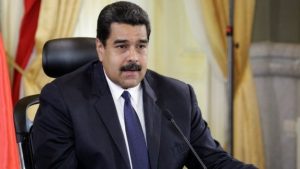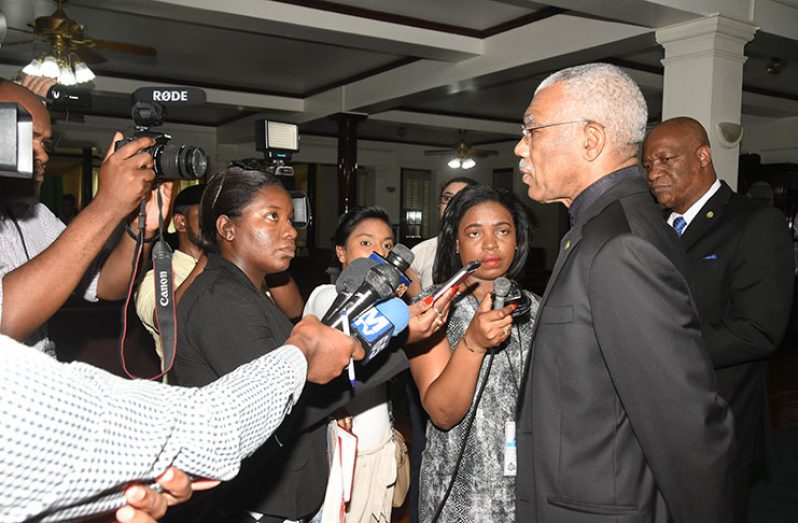…President urges respect for UN SG ruling
…but Venezuela rejects decision, wants to return to Good Offices process
PRESIDENT David Granger has said that the decision by the United Nations Secretary-General Antonio Guterres to refer the Guyana/Venezuela territorial controversy to the International Court of Justice (ICJ) should be respected by both countries. But his counterpart in Caracas, Nicolas Maduro, has rejected the decision, saying that it wishes to continue negotiations at the bilateral level.
Guyana and several other diplomats had warned that Venezuela was using the Good Offices process as a stalling tactic. On the sidelines of a swearing-in ceremony at State House on Wednesday, President Granger told reporters that the decision to have the UN Secretary-General decide on a method of resolution to the controversy was mutually agreed by both countries.
“Sending the matter to the secretary-general was a course of action that was mutually agreed on, so this outcome should be accepted by both sides,” he said. According to facts presented by the Ministry of Foreign Affairs, Venezuela after agreeing and honouring the 1899 Arbitral Tribunal Award for half of a century, the Spanish-speaking country in 1962 unilaterally and without any basis or evidence contended that the 1899 Award was null and void. The 1899 Arbitral Tribunal Award had given more than 90 per cent of an area to then British Guiana (now Guyana).

By February 1966, the Geneva Agreement was reached. It was under that agreement that both Guyana and Venezuela in 1982 requested the intervention of the UN Secretary-General in deciding on the method to bring the controversy to an end.
At the time of the interview, President Granger expressed the hope that Venezuela would have displayed some level of maturity and accept the decision of Mr. Guterres. ‘The Geneva Agreement was signed in February 1966, even before we became Independent and we hope that Venezuela’s Government has the maturity to accept the decision of the secretary-general,” he said, while reiterating that the course of action was mutually agreed by both countries.
Rejection
However, the Government of the Bolivarian Republic of Venezuela on Wednesday rejected the decision of the SG, stating that it remains firm in its position. “The Government of the Bolivarian Republic of Venezuela, faithful to its historical tradition and in accordance with the Bolivarian Diplomacy of Peace, reiterates its firm disposition to defend the territorial integrity of our Homeland and maintain political negotiation based on the 1966 Geneva Accord, as the only way to reach a peaceful solution, practical and satisfactory for both parties and in favour of our Peoples,” a statement issued by the Government of Venezuela read. It said too that it will continue to defend its sovereign rights.
President Granger has expressed the hope that the SG decision would not trigger negative behaviour by Venezuelans, noting that Guyanese have suffered enough. “We have already been victims of unwanted migration even by soldiers, by miners, we have been victims of violence, persons who are destitute looking for food, we have been victims of attacks by what they call Syndicatos, which are armed gangs,” he pointed.
Mobilising funds
Notwithstanding Venezuela’s objection, President Granger said the government will mobilise the necessary funds to ensure Guyana is properly represented at the ICJ and is given the best legal advice. “It is very important, we have waited a long time for this, but now that the matter has reached this stage we will embark on a prudent course to ensure that we get the best representation [at] the ICJ. It is not going to be a swift process, we are aware of that, but we are very confident that the outcome would be one that our children can thank us for,” he told reporters.

The President said government hopes that the matter will be called before the ICJ as soon as possible. “We are anxious to have this matter go before the court as quickly as possible. It is not in our hands, the court of course like any court has procedures and we have to abide by those procedures. But I am happy that for the first time since independence we have reached this far and I am very glad that the entire country is united behind this move.”
Stating that the controversy has stymied development in four regions – Barima-Waini, Potaro-Siparuni, the Rupununi and the Cuyuni-Mazaruni, the President said he is confident that the 1899 Tribunal Award will be vindicated and boost investors’ confidence in the country.
“So we are confident that this will contribute to our development, it will contribute to the confidence investors have in coming to Guyana and will contribute to the infrastructural development that we engaged other countries with Brazil and China, they would like to know that they are operating in a safe region of Guyana that is not under claim. Equally, our maritime space as we know is the zone of successful petroleum exploration, so we feel that this is a good move for Guyana and the international community must know the threat to Guyana’s territorial integrity will be removed by peaceful judicial means by the ICJ,” he stated.
The ICJ will make a final ruling in keeping with the tenets of the 1966 Geneva Agreement. Former UN Secretary-General Ban Ki-moon and Mr. Guterres, in keeping with the 1966 agreement, had agreed to refer the Guyana/Venezuela border controversy to the ICJ if significant progress was not made in arriving at a full agreement for the settlement of the controversy at the level of the Good Offices process.
UN statement
On Tuesday, Spokesperson for the UN SG, Stéphane Dujarric, said the long-standing controversy arose as a result of the Venezuelan contention that the Arbitral Award of 1899 about the frontier between British Guiana and Venezuela is null and void. In the Geneva Agreement of 1966, Guyana and Venezuela conferred upon the secretary-general the power and responsibility to choose a means of peaceful settlement from amongst those contemplated in Article 33 of the Charter of the United Nations. The Geneva Agreement also provides that if the means so chosen does not lead to a solution of the controversy, the secretary-general is to choose another means of settlement.
“Former Secretary-General Ban Ki-moon communicated to the parties on 15 December 2016, a framework for the resolution of the border controversy based on his conclusions on what would constitute the most appropriate next steps. Notably, he concluded that the Good Offices Process, which had been conducted since 1990, would continue for one final year, until the end of 2017, with a strengthened mandate of mediation. He also reached the conclusion that if, by the end of 2017, his successor, Secretary-General António Guterres, concluded that significant progress had not been made towards arriving at a full agreement for the solution of the controversy, he would choose the International Court of Justice as the next means of settlement, unless the Governments of Guyana and Venezuela jointly requested that he refrain from doing so,” Dujarric said.
He added that in early 2017, Secretary-General Guterres appointed a Personal Representative, Mr. Dag Halvor Nylander, who engaged in intensive high-level efforts to seek a negotiated settlement to the controversy. “The secretary-general has carefully analysed developments in 2017 in the good offices process and has concluded that significant progress has not been made toward arriving at a full agreement for the solution of the controversy. Accordingly, the secretary-general has fulfilled the responsibility that has fallen to him within the framework set by his predecessor in December 2016, and has chosen the International Court of Justice as the means to be used for resolution of the controversy. In reaching this decision, the secretary-general has also reached the conclusion that Guyana and Venezuela could benefit from the continued good offices of the United Nations through a complementary process established on the basis of the powers of the secretary-general under the Charter of the United Nations.
The secretary-general, in accordance with the principles of the United Nations, remains committed to accompany both States as they seek to overcome their differences regarding this border controversy,” the statement ended.











